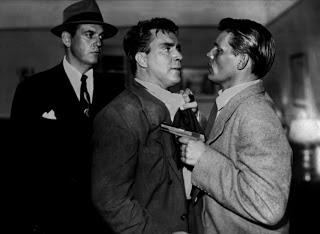 Rudolph Mate's D.O.A. (1950) offers an innovative film noir. Oft-imitated, its well-conceived race-against-time plot gives a boost to shaky storytelling.
Rudolph Mate's D.O.A. (1950) offers an innovative film noir. Oft-imitated, its well-conceived race-against-time plot gives a boost to shaky storytelling.Accountant Frank Bigelow (Edmond O'Brien) vacations in San Francisco, drinking and carousing with a sales convention. Bigelow becomes ill and discovers he's been slipped a poisoned drink which dooms him to a lingering death. Bigelow decides to uncover his murderers before he passes, discovering that business associate Phillips had frantically called him before taking his own life. Bigelow's investigation brings him afoul of crime boss Majak (Luther Adler) and his goons, who won't wait for the poison to finish him.
D.O.A. starts with a great introduction: Ernest Laszlo's camera tracks Bigelow as he staggers into a police station, then announcing to a detective that he's reporting his own murder. It's a great device that Mate and writers Russell Rouse and Clarence Greene milk for its potential, giving the movie instant suspense as Bigelow races to uncover his assailants. Mate's fast-paced direction keeps the movie clicking, with the seedy characters and misdirection expected from the genre.
Outside of its premise and pacing, D.O.A. occasionally clucks. Segments of the movie devolve into long exposition interrupted by chases, building suspense but not always seeming coherent. Bigelow's conflict with Majak is actually a prolonged red herring, with evidence pointing to Phillips' inner circle. Cringeworthy scenes with Bigelow's secretary-girlfriend Paula (Pamela Britton) eat time while occasionally sprinkling relevant information; Paula's an irritating drip and we don't care if Bigelow's neglecting her.
Despite its minor faults, D.O.A. delivers in its essentials. Mate provides compelling scenes of seedy bars, with a high-intensity jazz performance, and a tense warehouse shootout. The best scene has Bigelow trapped with Chester (Neville Brand), a crazed gunsel eager to kill him. Driving slowly through the city, Bigelow agonizes over escape or fighting back, suspense building as they roll through Los Angeles and spill into a drugstore. The final reveal is adequate, though its banality seems almost a letdown.
Edmond O'Brien anchors the movie, graduating from weariness to grim, desperate determination. O'Brien isn't especially likeable but his plight generates its own sympathy, fighting against time to unravel his own death. He's surrounded by memorable character turns: Luther Adler's silky mobster, psychotic Neville Brand, Beverly Garland as a tough secretary, William Ching as a slimy businessman.
D.O.A. inspired many imitators, including a 1988 remake featuring Dennis Quaid. Its atmosphere and story hold up, overcoming minor reservations.

